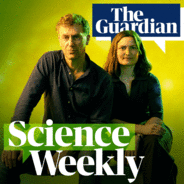As Christmas approaches, many of us will have spent the last few weeks trying to pick out the perfect presents for friends, family and colleagues. For both giver and receiver, exchanging gifts can be filled with delight – or dread, as a smile slowly fades into a look of feigned enthusiasm. But what does science say about how to avoid unwanted gifts and unpleasant surprises? Ian Sample speaks to Julian Givi about his research unwrapping what we all actually want under the tree, and hears his top tips for choosing a winning present every time. Help support our independent journalism at theguardian.com/sciencepod

Wissenschaft & Technik
Science Weekly Folgen
Twice a week, the Guardian brings you the latest science and environment news
Folgen von Science Weekly
300 Folgen
-
Folge vom 22.12.2022The science of how to give better gifts
-
Folge vom 20.12.2022What does Cop15’s buzzword ‘nature positive’ mean?A historic deal has been struck at the UN’s biodiversity conference, Cop15, which will set a course for nature recovery from now until 2050, including a target to protect 30% of the planet for nature by the end of the decade. One of the key phrases guiding the summit across the two weeks of negotiations was ‘nature positive’. Madeleine Finlay hears from the biodiversity reporter Phoebe Weston about what ‘nature positive’ meant at Cop15, and what she’d like to see from countries now the final agreement has been made, and speaks to biodiversity professor EJ Milner-Gulland about how to stop the term ‘nature positive’ becoming another way for companies to greenwash their businesses.. Help support our independent journalism at theguardian.com/sciencepod
-
Folge vom 15.12.2022‘Nothing is impossible’: the major breakthrough in nuclear fusionThis week, researchers at the US National Ignition Facility in California achieved a major breakthrough in nuclear fusion. For the first time, humans have harnessed the process that powers the stars to generate more energy from a fusion reaction than was used to start it — otherwise known as ‘ignition’. But how close are we to moving this from laboratories to power plants, and will it become the clean, safe, and abundant source of energy the world so desperately needs? Ian Sample speaks to Alain Bécoulet about what’s being called ‘one of the most impressive scientific feats of the 21st century’. Help support our independent journalism at theguardian.com/sciencepod
-
Folge vom 13.12.2022Will Cop15 tackle the growing problem of invasive species?Invasive non-native species are on the rise around the world and, despite efforts to tackle the issue, their numbers are higher than ever. They have become one of the key driving forces behind biodiversity loss, posing an even greater threat to biodiversity than the climate crisis. Monitoring, tracking and managing invasive species is one of the issues up for discussion at the UN’s biodiversity Cop15, which is now in full swing in Montreal, Canada. Ian Sample gets an update on how Cop15 is progressing from biodiversity and environment reporter Patrick Greenfield, and hears from Prof Helen Roy from the UK Centre for Ecology & Hydrology about why invasive species pose such a serious risk to native wildlife. Help support our independent journalism at theguardian.com/sciencepod
